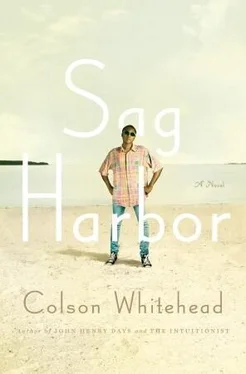Like us, like all of us, present or as yet unaccounted for, NP had come out here every summer of his life, and even before he was born, as his mother had waded into the bay to cool her pregnant belly. We had beaten each other up, stolen each other's toys, fallen asleep in the backseats of station wagons together as we caravanned back from double features at the Bridgehampton Drive-In, the stars scrolling beyond the back window. We were copying our parents, who went back just as far, beating each other up thirty years ago under the same sky. Eating each other's barbecue, chasing each other down the hacked-out footpaths to the beach before there were roads, beach houses, a community at all.
“Hey Benji, watch it!” NP cried out. “You're messing up my kicks!”
I had been circling around him and Reggie, and my front wheel had squeezed out a pebble and sent it flying. The pebble collided with NP's sneaker, which I now noticed was the Fila model that Reggie was wearing. And just as white.
I didn't see any mark. NP pulled a white handkerchief from his pocket, licked it, and rubbed it against his sneaker.
“Sorry about that,” I said.
“These are my Filas.”
“There is one thing, though.” I cleared my throat. “I'm not going by Benji anymore. I'm going by Ben.”
“What?” NP looked at Reggie for confirmation. I hadn't broken the news to Reggie yet. He tilted his head.
“I want to go by Ben,” I said. “You know, have people call me Ben instead of Benji.”
Harkening back to the aforementioned Plan: No more of this Benji shit. It was a little kid's name, and I was not a little kid anymore. Ben, Ben. Case in point: stuck there next to my brother in that “Benji 'n' Reggie” construction — it was demeaning. Benji was the name of a handholder, not a fingerfucker or avid squeezer of breasts, or whatever tyro sexual-type act I would engage in once I found a willing subject. One step at a time, and a step away from Benji was a good one.
“Okay Benji, whatever, homie.” NP yawned.
Reggie shook his head. “Let's go to town.”
The three of us started back down the street. I was pretty excited to get out of the developments and grab a slice. To see if everything was where it was supposed to be. But when we should have been turning right, NP steered left, and Reggie followed.
“Where are you guys going?” I asked.
“We should take the beach,” NP said. “It's faster.”
“I can't take my bike on the sand.”
A moment passed where we all looked at the Li'l Red Fuji. And its pretty pink handlebars. It should be noted that they were not a pristine pink, but one much-grubbed by years of sweat and assorted boyhood antics. Nonetheless.
“I told you,” Reggie said.
“It's a shortcut,” NP said. He dribbled his basketball for a second, then tucked it under his arm. “We'll meet you there. I ain't getting my bike out,” he said. “The tires are flat. Mess up the rims.”
I looked to Reggie for backup. He was looking down at his sneakers.
“Where are you going to be?” I exhaled loudly. Town wasn't that big, but still.
“Conca D'Oro, whatever,” NP said. “You'll find us.”
They disappeared down the path to the beach, that narrow aperture into water and sunlight. There was that one variation of out, Who else is out? which was the most important out of all. Everything depended on it. Who else is out? We asked each other. We needed to know, Is it just you and me or is there another to save us from each other?
THERE WERE SOME WHITE PEOPLE COMING UP THEbeach so we got out the binoculars. White people owned the waterfront behind town, but the beach was ours, and any infiltration had to be checked out. The front wall of our living room was glass, giving us superior angles of surveillance, and my father kept binoculars handy for this very purpose. He owned two pairs, one for here and one for the city, where we faced West End Avenue and teeming beehives of naked potential. At any given moment, a nice percentage of apartments had their blinds up, their curtains spread, and you never knew what drama might emerge if you were on the lookout. Best to keep the binoculars close.
“That's trespassing,” NP said.
Bobby raised the binoculars. “It looks like two fags holding hands,” he said.
It was the heyday of fag. Get a bunch of teenage virgins and future premature ejaculators together, and you were going to hear fag a lot. Get a bunch of kids together who felt punked out in various ways, and the collective mind sought ways to punk out others. A touch of homophobia was also good for hiding any nascent predilections and/or yearnings lurking about. Binoculars: a device that facilitates looking down on people.
“They better not try to come up here,” NP said. “I'll bust their ass.”
“Shit, you'd be like, ‘Come up here, sailor, I just dropped the soap.’”
“Dag.”
It was also the heyday of dag. Dag was bitter acknowledgment of the brutish machinery of the world. It was a glimpse into the cruel void, as evidenced by the fact that it was often followed by “That was cold.” In the heyday of dag, we accepted our duty to call attention to such moments, taking turns at this minor masochism. It passed the time.
I took the binoculars from Bobby. The intruders were actually a middle-aged man and woman, soft and shuffling. They clutched their shoes and dug their toes into the damp sand. Every few steps, one of them pointed at some feature of the landscape — the lighthouse squatting on its nest of rocks, the green Mohawk of seaweed on a black stone, the pale carcass of an overturned horseshoe crab — as their companion gaped in wonder. The gender confusion — apart from some wishful thing on NP's part, as he was always trying to start some shit — came from their shapeless clothes, the way they disappeared into the T-shirt — khaki shorts combo that was the official uniform of tourists the world over.
“We should go down there and tell them to get off our beach,” Bobby said. He lived in Ninevah, down the way, hence his interest in keeping the sands undefiled by outsiders, but everybody in the developments, whether they lived on the beach or not, felt that selfish tug of ownership when they saw strangers — i.e., white people — on our little stretch. Most of the strollers came from the Public Beach, visiting friends for the afternoon and then letting their curiosity draw them toward Azurest. We made noises of outrage, but never did anything. There was an older lady or two of the first generation who were known to fly across the sand and admonish strangers that dogs weren't allowed on the beach, if the people in question happened to be chaperoning some yapping enthusiast off-leash, but mostly we grumbled to remind ourselves we had rights to assert, and that was enough.
Already the couple was turning back. Visitors never made it that far up the beach in those days. Watching them slow down, stop for a conference, and then turn back made you an audience to a familiar pantomime. Something was off. Everyone was brown. The ladies plopped on striped beach chairs and towels, the kids stirring sand with plastic shovels and chipped clamshells. They were every shade in the dessert menu of words beloved by romance novelists to describe African American skin, chocolate and caramel, butterscotch and mocha. Black eyes glared down from the beach houses, the lookouts on the decks of our armada. Yes, something is off, let's head back.
They rarely made it past the Rock. The Rock was a few houses down from ours and a powerful psychological meridian. Kids told each other, “I'll race you to the Rock,” because it was an impossible, panting distance. Parents warned, “Don't go past the Rock,” to keep their offspring in view as they gossiped and sipped Fresca. Parents let their attention lapse, argued, flirted, dozed — as long as the kids didn't stray past the Rock, nothing would happen to them. Perhaps this has happened to you, on beaches: you start drifting off while lying on a beach blanket, close your eyes and shut down your ears only to find yourself revisiting some personal torment still powerful enough after all these years to suck you into its undertow. Don't know what I'm talking about? Never mind. Take my word, friend, the Rock was an anchor to keep you from drifting too far.
Читать дальше












